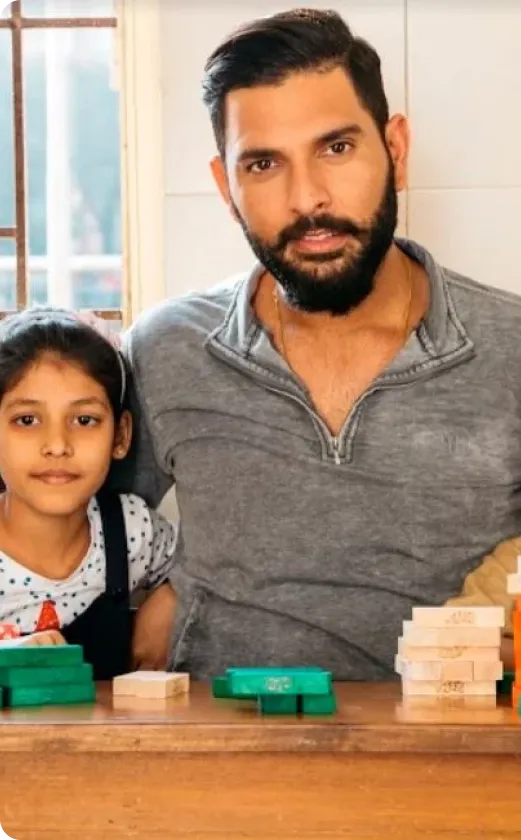What is Cancer
Cancer is a disease which occurs when changes in a group of normal cells within the body lead to uncontrolled, abnormal growth forming a lump called a tumour; this is true of all cancers except leukaemia (cancer of the blood). If left untreated, tumours can grow and spread into the surrounding normal tissue, or to other parts of the body via the bloodstream and lymphatic systems, and can affect the digestive, nervous and circulatory systems or release hormones that may affect body function.
How Common is Cancer?
Around the world:
- As per World Health Organisation, in 2018 there were 18.1 million new cases and 9.6 million deaths reported globally.
- One in 5 men and one in 6 women worldwide develop cancer during their lifetime, and one in 8 men and one in 11 women die from the disease.
- Worldwide, the total number of people who are alive within 5 years of a cancer diagnosis, called the 5-year prevalence, is estimated to be 43.8 million.
In India:
- As per World Health Organisation, in 2018 there were 11,57,294 new cases and 7,84,821 deaths reported in India.
- Estimated number of people living with cancer are 20,25,000
Is there a vaccine for cancer?
Currently there is a vaccine available for cervical cancer only. It is recommended for girls between the age of 9-14. Speak with your paediatrician for more information.
To find out more, logon to: https://www.who.int/immunization/diseases/hpv/en/
Who gets cancer?
Anyone can get cancer, although the risk goes up with age. Your individual risk depends on factors such as whether you smoke, lifestyle choices such as what you eat and how much you exercise, your family history of cancer, and factors in your workplace and environment.
What are the stages of cancer, and what do they mean?
Cancer typically has four stages: I through IV (1 - 4). Some cancers even have a stage 0 (zero). Here’s what these stages mean:
- Stage 0: This stage means the cancer is still found in the place it started and hasn’t spread to nearby tissues. Stage 0 cancers are often curable.
- Stage I: This stage usually represents a small tumor or cancer that hasn’t grown deeply into nearby tissues. It’s sometimes called early-stage cancer.
- Stages II and III: Usually these stages represent larger cancers or tumors that have grown more deeply into nearby tissues. They also may have spread to lymph nodes. However, they haven’t spread to other organs or parts of the body.
- Stage IV: Cancer in this stage has spread to other organs or parts of the body. It may be referred to as metastatic or advanced cancer.
In which part of my body can I get cancer?
Cancer can occur in any part of the body. It usually starts off painless and at early stages often the symptoms are not noticeable. It gradually increases in size and starts spreading to surrounding areas, damaging the tissue.
How does cancer spread?
As cancer grows, it invades the surrounding structures and causes damage. It spreads to the draining lymph nodes. Through the blood stream it spreads to the others parts of the body like lung, liver, bones, brain etc.
What is metastasis?
Metastasis occurs when cancer spreads from one part of the body to another. The primary site is the location of the original tumour and the secondary site is the metastasis (spread of cancer cells to another place in the body).
How is cancer diagnosed?
Visible signs and symptoms are not enough to know whether you have cancer. If your healthcare practitioner suspects cancer you will be prescribed more tests for a confirmed diagnosis, which may include x-rays, blood tests, or a biopsy.
What is biopsy?
In biopsy a piece of the lump (tumour) or abnormal area is taken out and sent to the lab. There, a doctor who specializes in diagnosing diseases (called a pathologist) looks at the cells under a microscope to see if cancer cells are present.
Can cancer be cured?
Yes, most cancers are curable if detected and treated at an early stage.
With the advancements of modern medicine the chances of cancer treatment have become much higher than before provided treatment begins at an early stage. Regular screening & early detection is the key.
What is a remission?
Remission means that the signs and symptoms of your cancer are reduced. Remission can be partial or complete. In a complete remission, all signs and symptoms of cancer have disappeared. If you remain in complete remission for 5 years or more, some doctors may say that you are cured.
Members / Caregivers
-
I've just been diagnosed with cancer and I'm feeling overwhelmed. I don't even really know what questions to ask, any advice?
- Find a cancer specialist (oncologist).
- Learn all you can- read and talk to others who have had cancer.
- Take care of yourself- continue to eat a healthy diet, exercise,
- Join a patient support group- they can be an excellent source of information and emotional support.
- Talk honestly with your loved ones- your family and friends don’t always know
what to do or say. You can help them support you by being honest with them.
-
I've been diagnosed with cancer and it was confirmed with a biopsy. I keep hearing about second opinions. Shall I get a second opinion?
Second opinion is often valuable. Even if your diagnosis does not change with a second opinion, taking a second opinion on treatment options is useful to help you determine the best way to treat your specific cancer.
-
Can tumour biopsy or cancer surgery cause cancer to spread in the body?
The chance that biopsy or surgery will cause cancer to spread to other parts of the body is extremely low. Following standard procedures, surgeons use special methods and take many steps to prevent cancer cells from spreading during biopsies or surgery to remove tumours. We recommend that you follow the advice of your treating doctor. If required get a second opinion.
-
I have been told that I have cancer and the doctor said it was “inoperable.” Does that mean that my situation is hopeless and that I may not survive?
No!
Inoperable means that surgery is not an option for your type of cancer. There may be other treatment options to shrink or even kill the cancer, slow its growth, and to help with side effects. There are treatments available for every stage of cancer which may include chemotherapy, radiotherapy, immunotherapy etc.
-
Does cancer treatment have any side effects?
Yes, most cancer treatments do have some side effects, which could range from mild, moderate to severe. Each type of cancer treatment has different side effects. Also, different patients will experience different side effects for the same type of treatment, which makes it difficult to predict what side effects a patient will have.
For more information on treatment side-effects and how to manage them, please click here.
https://www.cancer.org/treatment/treatments-and-side-effects/physical-side-effects.html
-
I am thinking of avoiding treatment due to the fear of side effects.
A person who is thinking of refusing cancer treatment due to fear of side effects should talk with the doctor to clearly understand the likely outcomes of both treatment and non-treatment before making a decision. If cancer is allowed to progress without treatment, symptoms get worse and new symptoms build up over time. Untreated cancer commonly causes death.
In contrast, cancer treatment often saves lives – especially when cancer is found and treated early. Even when it can’t cure the cancer, treatment can often help people live longer. And medical care can always be used to help a person feel better by reducing pain and other symptoms (palliative care).
For more information on treatment side-effects and how to manage them, please click here.
https://www.cancer.org/treatment/treatments-and-side-effects/physical-side-effects.html
-
I've started chemotherapy treatment for my cancer. How long will I be on this treatment?
This is a question to ask your doctor. Even though treatment regimens have similarities, they are often tailored to the individual patient. Therefore, it is important you speak frankly with your doctor.
In contrast, cancer treatment often saves lives – especially when cancer is found and treated early. Even when it can’t cure the cancer, treatment can often help people live longer. And medical care can always be used to help a person feel better by reducing pain and other symptoms (palliative care).
For more information on treatment side-effects and how to manage them, please click here.
https://www.cancer.org/treatment/treatments-and-side-effects/physical-side-effects.html
-
Does my attitude—positive or negative— affect the outcome of treatment? What can I do to maintain a positive attitude during treatment?
Numerous cancer survivors have shared out of their own experience that staying in a positive frame of mind really helped them during their treatment. Even doctors and physicians often encourage patients to keep up a healthy ‘fighting spirit’ and a positive attitude during their treatment.
We recommend that you try and stay in a positive frame of mind during your cancer treatment. If you feel you are not able to do so on your own, you may wish to reach out to a professional counsellor or psychologist, who can help equip you with some of the emotional tools required to deal with cancer treatment. Today, with the advancements of modern medicine, there are specialised doctors & psychologists that practice psycho-oncology, an interdisciplinary field at the intersection of physical, psychological, social, and behavioural aspects of the cancer experience for both patients and caregivers.
You could also connect to a Patient Support Group near you. Even though a lot of people receive support from friends and family, the number one reason they join a support group is to be with others who have similar cancer experiences. Some research shows that joining a support group improves both quality of life and survival.
-
Will I lose my hair during chemotherapy? How long will it take for it to grow back?
One of the side-effects of chemotherapy may be a complete loss of hair or a thinning of the hair. This will depend upon the type of chemotherapy you have been given. Hair loss can range from the scalp, eyelashes, eyebrows, pubic area, to the entire body.
This can be a emotionally challenging side effect of treatment, especially to young women. Many women decide to wear wigs while others choose to leave their heads bare and/or wear a scarf around their heads in public.
Your hair should begin to grow back between 6-8 weeks after you have finished treatment, but remember that everyone's experience is different
-
If two people living in the same house, eating the same diet and exposed to the same environment, how can one of them develop cancer and the other doesn’t?
The development of cancer is very complex and different for each person. There are many elements that can contribute to the growth of cancerous cells and the ability of your body to defend against them. There is still much to discover about the causes of cancer, and whilst environmental factors such as diet, exercise and smoking can increase your risk of cancer, it is your genetics and family history that control how your body will be able to repair and defend against the damage caused.
-
Is cancer contagious?
- No! You can’t catch cancer from someone who has it.
- You won’t get cancer by being around or touching someone with cancer. Don’t be afraid to visit someone with cancer. They need the support of their family and friends.
-
If someone in my family has cancer, am I likely to get cancer too?
Not necessarily. Cancer is caused by harmful changes (mutations) in genes. Only very few cancers cases (5%-10%) are caused by harmful mutations that are inherited from a person’s parents.
-
Can tumour biopsy or cancer surgery cause cancer to spread in the body?
The chance that biopsy or surgery will cause cancer to spread to other parts of the body is extremely low. Following standard procedures, surgeons use special methods and take many steps to prevent cancer cells from spreading during biopsies or surgery to remove tumours. We recommend that you follow the advice of your treating doctor. If required get a second opinion.
-
I have been told that I have cancer and the doctor said it was “inoperable.” Does that mean that my situation is hopeless and that I may not survive?
No! Inoperable means that surgery is not an option for your type of cancer. There may be other treatment options to shrink or even kill the cancer, slow its growth, and to help with side effects. There are treatments available for every stage of cancer which may include chemotherapy, radiotherapy, immunotherapy etc.




